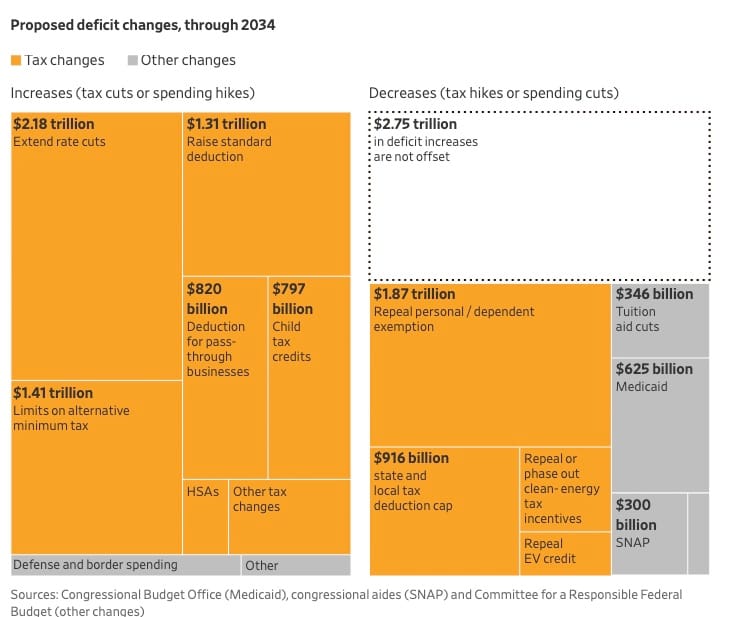May 20 2025
GOP Pushes Deficit Bill; Deportation Push Not Shrinking Labor; Trade Spat Fuels Brazil Soy Boom; Portland Tower Fire Sale; Trump-Putin Call

GOP Pushes $3 Trillion Deficit Bill Amid Tax Cuts, Spending Hikes
Trump's Deportation Push Yet to Shrink Migrant Labor Pool, Data Shows
US-China Trade Spat Fuels Brazilian Soy Boom, Shifting Global Market
Once Premier Portland Office Tower Faces Fire Sale, Symbolizing Commercial Real Estate's Struggles
Putin's Ukraine Stance May Win War but Risks US Economic Thaw
GET THE CITIZEN JOURNAL APP - FREE!
1. GOP Pushes $3 Trillion Deficit Bill Amid Tax Cuts, Spending Hikes
Republicans are trying to get a fiscal bill through the House this week. It’s a complex piece of legislation that includes tax cuts, spending increases, spending reductions and some tax hikes. In total, it would increase budget deficits by nearly $3 trillion over a decade.

WSJ
2. Trump's Deportation Push Yet to Shrink Migrant Labor Pool, Data Shows
WASHINGTON—President Trump’s mass-deportation push has instilled widespread fear among migrants. What it hasn’t done, so far, is stop many from showing up for work. While data covering immigrants lacking permanent legal status is fragmentary, what is available shows no broad pullback from the labor force. In the three months since Trump took office, employment has continued to grow. That includes many industries reliant on workers lacking legal status: construction; the category that includes janitorial and landscaping services; food-manufacturing and restaurants; and staffing firms. As of April, there were 31.8 million foreign-born workers with jobs, up 0.1% from January and 4.4% from a year earlier, according to a monthly Census Bureau survey of households. The data doesn’t distinguish between workers in the U.S. legally and those without legal status. “In general it’s surprising to me,” said Tara Watson, an economist at the Brookings Institution who studies immigration in the economy. “We haven’t heard stories of big chicken shortages or [higher] construction costs.” A Kaiser Family Foundation survey published May 8 said 41% of U.S. immigrants—including naturalized citizens—worry that they or a family member could be detained or deported, up from 26% in 2023. But many workers without legal status say they have to keep working out of economic necessity. Some have lived in the U.S. for years or even decades and have families, homes and cars to pay for. The certainty of falling behind on bills often outweighs the unquantifiable risk of being detained by federal authorities, some migrants say.
WSJ
3. US-China Trade Spat Fuels Brazilian Soy Boom, Shifting Global Market
CONFRESA, Brazil — At the agricultural fair along Highway 158, the cowboy hats were on and the mood was festive. A decadent arrangement of fine cheeses, fresh fruits and sausages had been spread out across several tables. People were joking around, sipping guaraná, the local soda, and admiring expensive farming equipment draped with the Brazilian flag. In the heart of Brazil’s soy country, there was reason to celebrate: Donald Trump had reignited a trade war with China, and farmers here were ready to reap the rewards. China is by far the world’s largest market for soy, importing more than 100 million tons each year to sustain its vast hog farms. For years, this was a boon for both Brazilian and American farmers. Together, they supplied the bulk of China’s demand for soy, and the product became the top agricultural export for both countries. But the first trade war between Trump and China in 2018 sent American exports plummeting. Brazil overtook the U.S. as the world’s largest soy producer and, by last year, accounted for more than 70 percent of soy exports to China.1
Washington Post
4. Once Premier Portland Office Tower Faces Fire Sale, Symbolizing Commercial Real Estate's Struggles
After Digital Trends moved out of the U.S. Bancorp Tower in Portland, Ore., the technology publisher didn’t hold back about why it left. The property, once a premier address in the city, was afflicted with “vagrants sleeping in hallways of vacant office floors.” They were “starting fires in stairwells, smoking fentanyl and defecating in common areas,” according to papers the company filed in a lease-termination lawsuit. Two years later, the city’s biggest office tower stands more than half empty. U.S. Bank, the largest tenant whose parent company’s name is on the building, pulled most of its employees out last year after more than a century in the city. The 42-story tower was recently put up for sale. The building affectionately known as Big Pink because of its pink-hued Spanish granite and pink glazed glass has an asking price of about $70 million, according to brokers. That is more than 80% below what the owners paid for it a decade ago. Even investors like Jordan Menashe who seek out distressed properties are steering clear of this one. He says any turnaround looks years away. “I don’t see a way to get it into the green in the next five to seven years,” Menashe said.
WSJ
5. Putin's Ukraine Stance May Win War but Risks US Economic Thaw
Since his invasion in 2022, President Vladimir V. Putin of Russia has wanted to end the war in Ukraine on his terms.2 And in the complex diplomatic maneuvers of recent weeks, the Russian leader has been able to defend his approach to negotiate a comprehensive peace deal while continuing to wage war in Ukraine, which he believes is going his way. His hard-line position has withstood pressure from Ukraine, from the European Union and, until recently, from the United States for an immediate cease-fire before starting peace talks. After speaking with Mr. Putin by phone on Monday, President Trump said that he welcomed direct talks between Ukraine and Russia toward a cease-fire and a broader deal to end the war, in effect making a final break with his earlier promise to bring a swift end to the conflict.3 But Mr. Putin’s diplomatic victory could undermine his broader economic goals to normalize relations with the United States. After speaking with Mr. Putin, Mr. Trump emphasized that American economic rapprochement with Russia would come after peace in Ukraine, not before. If Mr. Trump keeps the two issues intertwined, it could confine Russia to an economic purgatory, with little immediate chance of getting relief from Western sanctions or of bringing the foreign investment dangled by Mr. Trump.
NYT
May 20, 1862: President Lincoln signs the Homestead Act
On May 20, 1862, President Abraham Lincoln signed the Homestead Act, legislation that provided public lands to settlers. The act granted 160 acres of government-owned land to individuals who were heads of households and at least 21 years of age. Recipients were required to build a residence on the property and cultivate the land for five years to receive full ownership. By the conclusion of the Civil War in 1865, approximately 15,000 homestead claims had been filed in territories that later became Kansas, Nebraska, Wyoming, Montana, and Colorado. The program attracted both genuine agricultural settlers and those who utilized the system for other purposes. Some claims were filed by individuals acting on behalf of commercial interests seeking access to natural resources such as minerals, timber, and water. By 1900, the Homestead Act had facilitated the transfer of approximately 80 million acres of public land to private ownership. This area is roughly equivalent to the size of the entire United Kingdom. The redistribution of this vast territory played a significant role in America's development as a continental power, enabling agricultural expansion, resource extraction, and settlement of the western frontier. The implementation of the Homestead Act coincided with federal policies that removed Native American tribes from their traditional territories and relocated them to reservation lands, creating space for the westward expansion of American settlement.
SUBSCRIBE ONLINE TO GET THE US CITIZEN JOURNAL IN YOUR INBOX - FREE!


See the Ad Astra Podcast! Released on Apple and Spotify around 10a CST.
Sponsors (click me!)





Sources
- https://www.wsj.com/politics/policy/what-is-in-republican-tax-bill-39809182?mod=hp_lead_pos5
- https://www.wsj.com/us-news/us-migrant-workforce-trump-deportation-push-ce3dd0f5?mod=hp_lead_pos1
- https://www.washingtonpost.com/world/2025/05/06/brazil-soy-exports-china-american-farmers/
- https://www.wsj.com/real-estate/commercial/a-fire-sale-of-portlands-largest-office-tower-shows-how-far-the-city-has-fallen-322e0f2d?mod=wknd_pos1
- https://www.nytimes.com/2025/05/20/world/europe/russia-putin-ukraine-ceasefire.html


